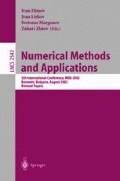Abstract
An Immersed Interface Method (IIM) is developed for a reaction-diffusion problem with discontinuous coefficients and a moving own singular source. On a regular grid using Crank-Nicolson method a second order difference scheme is constructed. Numerical examples, which confirm theoretical analysis, are discussed.
Access this chapter
Tax calculation will be finalised at checkout
Purchases are for personal use only
Preview
Unable to display preview. Download preview PDF.
References
Beyer, R., Leveque, R.:Analysis of a one-dimensional model for the immersed boundary method. SIAM J. Numer. Anal. 29 (1992) 332–364.
Bimpong-Bota, K., Nizan, A., Ortoleva, P., Ross, J.: Cooperative phenomena in analysis of catalytic sites. J. Chem. Phys. 66 (1970) 3650–3683.
Kandilarov, J.: A second-order difference method for solution of diffusion problems with localized chemical reactions. In: Samarskii A.A., Vabishchevich P. N., Matus P. P. (eds.): Proceed. of Second Int. Conf. Finite Difference Methods: Theory and Applications. Minsk (1999) 63–67.
Kandilarov, J., Vulkov, L.: The immersed interface method for a nonlinear chemical diffusion equation with local sites of reactions. (submitted).
Li, Z.: Immersed interface method for moving interface problems. Numer. Algorithms, 14 (1997) 269–293.
Pierce, A., Rabitz, H.: An analysis of the effect of defect structures on catalytic surfaces by the boundary element technique. Surface Science, 202 (1988) 1–31.
Samarskii, A.: The Theory of Difference Schemes. Nauka, Moscow (1977) (in Russian)
Samarskii, A., Friazinov, I.: Convergence of a homogeneous difference schemes for heat equation with discontinuous coefficients. Comput. Math. and Math. Phys. 1 (1961) 806–824.
Vabishchevich, P., Matus, P., Richagov, V.: On a class of difference schemes locally refined grids. Differ. Uravn. 31, 5 (1995) 849–857.
Vulkov, L., Kandilarov, J.: Construction and implementation of finite-difference schemes for systems of diffusion equations with localized chemical reactions. Comp. Math. Math. Phys. 40, 5 (2000) 705–717.
Author information
Authors and Affiliations
Editor information
Editors and Affiliations
Rights and permissions
Copyright information
© 2003 Springer-Verlag Berlin Heidelberg
About this paper
Cite this paper
Kandilarov, J.D. (2003). Immersed Interface Method for a Reaction-Diffusion Equation with a Moving Own Concentrated Source. In: Dimov, I., Lirkov, I., Margenov, S., Zlatev, Z. (eds) Numerical Methods and Applications. NMA 2002. Lecture Notes in Computer Science, vol 2542. Springer, Berlin, Heidelberg. https://doi.org/10.1007/3-540-36487-0_57
Download citation
DOI: https://doi.org/10.1007/3-540-36487-0_57
Published:
Publisher Name: Springer, Berlin, Heidelberg
Print ISBN: 978-3-540-00608-4
Online ISBN: 978-3-540-36487-0
eBook Packages: Springer Book Archive

